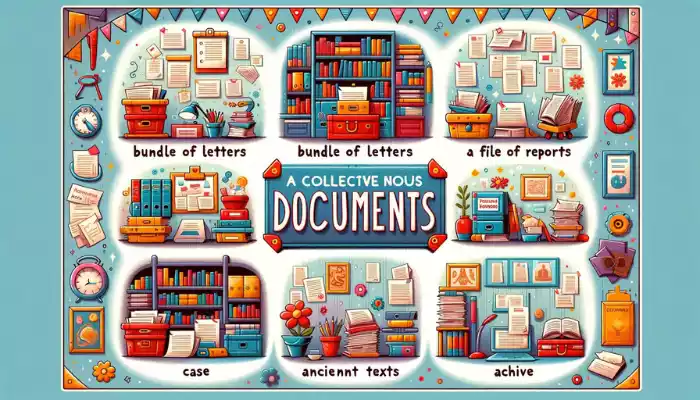Welcome to our journey into the world of collective nouns specifically tailored for our curious young readers Today we are diving into the fascinating collection of words we use to describe groups of documents. Whether it is a pile of papers on your desk or an important stack of forms each collective noun we are about to explore adds a sprinkle of magic to our everyday language. Let’s get started!
Collective Noun for Documents in table format
| Noun | Collective Noun | Definition | Example |
|---|---|---|---|
| Documents | Bundle | A group tied together | A bundle of letters |
| Documents | File | Documents grouped for order | A file of reports |
| Documents | Dossier | A collection of documents | A dossier on a case |
| Documents | Archive | Historical documents collection | An archive of ancient texts |
| Documents | Stack | Neatly arranged pile | A stack of forms |
Detailed Explanations and Examples for Documents
1. Bundle
A bundle refers to a group of documents that are tied or bound together. It’s often used when talking about letters or papers that are kept as one.
- Example 1: The lawyer carried a bundle of legal documents to the courtroom.
- Example 2: She found a bundle of old letters in the attic.
- Example 3: The teacher collected a bundle of homework assignments from the students.
2. File
A file is a collection of documents usually organized together for easy access and order. This term is commonly used in offices and schools.
- Example 1: The office clerk organized the invoices into a neat file.
- Example 2: Each student has a personal file with their records.
- Example 3: He added the new document to the project file.
3. Dossier
A dossier is a set of documents containing detailed information on a particular person or subject. It’s often used in legal, political, or business contexts.
- Example 1: The detective compiled a dossier on the suspect.
- Example 2: The company maintains a dossier for each employee.
- Example 3: Before the meeting, she reviewed the dossier on the proposed merger.
4. Archive
An archive is a collection of historical documents or records. Archives are important for preserving the past and are often used by researchers.
- Example 1: The historian visited the archive to study ancient manuscripts.
- Example 2: The library’s archive holds newspapers dating back to the 1800s.
- Example 3: The film archive contained rare footage from early cinema.
5. Stack
A stack refers to a neatly arranged pile of documents. This term is often used for paper documents that need to be organized or processed.
- Example 1: There was a stack of ungraded exams on the teacher’s desk.
- Example 2: The receptionist sorted through a stack of applications.
- Example 3: He added his report to the stack of documents for review.
Conclusion
Collective nouns for documents bring order and clarity to our conversations about paperwork and records. Whether it’s a file of reports, a dossier on a subject, or an archive of history, these terms help us navigate the world of information with ease. Now, let’s test your knowledge with a fun quiz!
Quiz Time!
1. What do you call a group of documents tied together?
- A) Bundle
- B) Stack
- C) Archive
- D) File
2. Which term refers to a neatly arranged pile of documents?
- A) Dossier
- B) Bundle
- C) Stack
- D) Archive
3. What is the term for a collection of historical documents?
- A) File
- B) Dossier
- C) Archive
- D) Bundle
4. A set of documents containing detailed information on a subject is called a:
- A) Stack
- B) File
- C) Dossier
- D) Archive
Quiz Answers
- A) Bundle
- C) Stack
- C) Archive
- C) Dossier
The Collective Nouns for Lawyers: A World of Legal Gatherings
The Creative Cluster: Exploring the Collective Nouns for Artists

